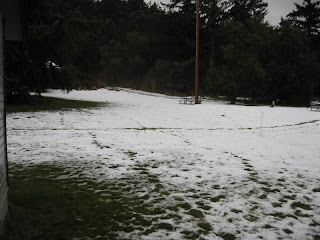All day the snow has been melting. I've been watching it from the windows of my cabin, sliding off the steeply-pitched cabin roofs neighboring my own, exposing patches of grass, creating icy slush on the park's streets. The temperature's risen, and a wind from the south is whipping the trees into a dance mostly stately, sometimes frenzied. I'm keeping my fingers crossed --again-- that the power doesn't go out. Oh, and it's also lightly raining. Again, sadly, I've forgone my walk on the beach. It's so slushy and slippery out that I'm worried about getting down the slope to the beach without mishap.
Working on the novel, which includes, of course, thinking its thinkier thoughts, continues more or less steadily. This morning it came to me that this novel wants epigraphs from fictional sources. I think I've provided such epigraphs in only one of my (unpublished) novels (The Asymptoptic Woman, which I consider a "private" novel not intended for publication). If done well (as in Andrea Hairston's Mindscape), such epigraphs can add another dimension to the novel's world and its stories. I'm sure readers of this blog will be able to think of half a dozen or a dozen examples of it done well just off the top of their heads. It's one of the devices in writers' technical toolboxes that are especially sf's own. Why this thought came to me isn't fully clear yet. But I hope that once I've got the epigraphs in place, I'll understand why it now seems so necessary.
Ranciere continues to provoke me to thought. This morning I encountered this gem: "The real must be fictionalized in order to be thought." I'm tempted to take that as an epigraph for the novel as a whole. (With all the fictious-sourced epigraphs reserved for chapters.)
Tomorrow, weather permitting, Tom will visit-- and bring the box of books and office supplies we forgot to load into the car last Sunday and take me shopping to the local food co-op (which I like very much). We will walk on the beach. And then I'll return to my low-speech state.


1 comment:
The Gilded Age. The Great Gatsby. The novels of Sir Walter Scott. The Devil's Dictionary. Most of Richard Condon's novels, which cite the fictional Keener's Manual. "Hell Is Forever" opens with a quote from a fictional writer, but one created by Beerbohm and not Bester.
Post a Comment